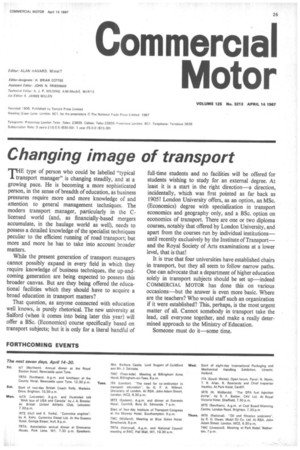Changing image of transport
Page 27

If you've noticed an error in this article please click here to report it so we can fix it.
E type of person who could be labelled "typical transport manager" is changing steadily, and at a growing pace. He is becoming a more sophisticated person, in the sense of breadth of education, as business pressures require more and more knowledge of and attention to general management techniques. The modern transport manager, particularly in the Clicensed world (and, as financially-based mergers accumulate, in the haulage world as well), needs to possess a detailed knowledge of the specialist techniques peculiar to the efficient running of road transport; but more and more he has to take into account broader matters.
While the present generation of transport managers cannot possibly expand in every field in which they require knowledge of business techniques, the up-andcoming generation are being expected to possess this broader canvas. But are they being offered the educational facilities which they should have to acquire a broad education in transport matters?
That question, as anyone connected with education well knows, is purely rhetorical. The new university at Salford (when it comes into being later this year) will offer a BSc. (Economics) course specifically based on transport subjects; but it is only for a literal handful of full-time students and no facilities will be offered for students wishing to study for an external degree. At least it is a start in the right direction—a direction, incidentally, which was first pointed as far back as 1905! London University offers, as an option, an MSc. (Economics) degree with specialization in transport economics and geography only, and a BSc. option on economics of transport. There are one or two diploma courses, notably that offered by London University, and apart from the courses run by individual institutions— until recently exclusively by the Institute of Transport— and the Royal Society of Arts examinations at a lower level, that is that!
It is true that four universities have established chairs in transport, but they all seem to follow narrow paths. One can advocate that a department of higher education solely in transport subjects should be set up—indeed COMMERCIAL MOTOR has done this on various occasions—but the answer is even more basic. Where are the teachers? Who would staff such an organization if it were established? This, perhaps, is the most urgent matter of all. Cannot somebody in transport take the lead, call everyone together, and make a really determined approach to the Ministry of Education.
Someone must do it—some time.
























































































































